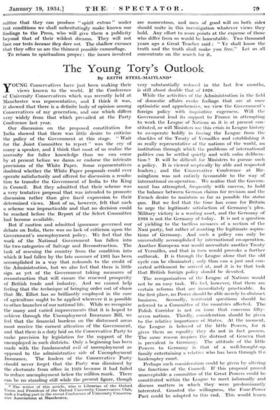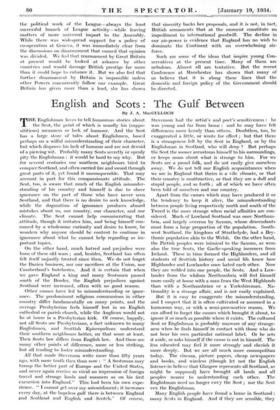The Young Tory's Outlook
By KEITH STEEL-MAITLAND•
YOUNG Conservatives have just been making their views known to the world. If the Conference of University Conservatives which was recently held at Manchester was representative, and I think it was, it showed that there is a definite body of opinion among Conservatives of my generation, and one which differs very widely from that which prevailed at the Party Conference last year.
Our discussion on the proposed_ constitution for India showed that there was little desire to criticize the policy of the Government at this stage. " Wait for the Joint Committee to report " was the cry of many a speaker, and I think that most of us realize the necessity for fuller knowledge than we can come by at present before we damn or endorse the intricate provisions of the White Paper. Some representatives doubted whether the White Paper proposals could ever operate satisfactorily and offered for discussion a resolu- tion to transfer the Government of India to the King in Council. But they admitted that their scheme was a very tentative proposal that was intended to promote discussion rather than give fixed expression to their determined views. Most of us, however, felt that such a scheme was impracticable and that no decision could be reached before the Report of the Select Committee had become available.
But if caution and admitted ignorance governed our debate on India, there was no lack of criticism upon the Government's unemployment policy. We feel that the work of the National Government has fallen into the two categories of Salvage and Reconstruction. The task of rescuing the country from the condition into which it had fallen by the late summer of 1931 has been accomplished in a way that redounds to the credit of the Administration, but we also feel that there is little sign as yet of the Government taking measures of reconstruction that will ensure the renewed prosperity of British trade and industry. And we cannot help feeling that the technique of bringing order out of chaos that Mr. Elliot has so brilliantly employed in the case of agriculture ought to be applied wherever it is possible to other branches of our national life. While we recognize the many and varied improvements that it is hoped to achieve through the Unemployment Insurance Bill, we feel that the financial burdens on the distressed areas must receive the earnest attention of the Government, and that there is a duty laid on the Conservative Party to make provision by legislation for the support of the unemployed in such districts. Only a beginning has been made with the fundamental evil of unemployment as opposed to the administrative side of Unemployment Insurance. The leaders of the Conservative Party should never forget that the Party was dismissed by the electorate from office in 1929 because it had failed to reduce unemployment below the million mark. There can be no standing still while the present figure, though
• The writer of this article, who is Librarian of the . Oxford Union and President of the Oxford University Conservative Club, took a leading part in the recent Conference of University Conserva- tive Associations at Manchester. •
very substantially reduced in the last few months, is still about double that of 1928.
While the activities of the Administration in the field of domestic affairs evoke feelings that are at once optimistic and apprehensive, we view the Government's foreign policy with inquisitive eagerness. Will the Government lend its support to France in attempting.
to work the League of Nations as it is at present con- stituted, or will Ministers use this crisis in League history to co-operate boldly in freeing the League from the shackles of the Treaty of Versailles and establishing it as really representative of the nations of the world, an institution through which the problems of international politics can be settled quietly and with calm delibera- tion ? It will be difficult for Ministers to pursue such a policy. It is viewed sceptically by able and respected leaders ; and the Conservative Conference at Bir- mingham was not entirely favourable to the way of international co-operation. We realize that the Govern- ment has attempted, frequently with success, to hold the balance between German claims for revision and the French desire to maintain as far as possible the status quo. But we feel that the time has come for Britain to urge the legitimate satisfaction of Germany's plea.
Military victory is a wasting asset, and the Germany of 1918 is not the Germany of today. It is not a question of yielding to the tactless menaces of a section of the Nazi party, but rather of assisting the legitimate aspira- tions of Germany. And such a policy can only be successfully accomplished by international co-operation.
Another European war would necessitate another Treaty of Versailles, and that in turn would provoke a further outbreak. It is through the League alone that the old cycle can be eliminated ; only thus can a just and con- certed settlement be arrived at, and it is to that task that British foreign policy should be devoted.
The reorganization of the League of Nations would not be an easy task. We feel, however, that there are certain reforms that arc immediately practicable. In the first place, no Power should be able merely to obstruct business. Secondly, territorial questions should be referred to a Committee of the countries affected. The Polish Corridor is not an issue that concerns fifty- seven nations. Thirdly, consideration should be given to the relative importance of States. At the moment, the League is beloved of the little Powers, for it gives them an equality they do not in fact possess.
The same reason inspires the distrust of Geneva that is prevalent in Germany. The attitude of the little Powers to Germany is that of a well-brought-up family entertaining a relative who has been through tl:e bankruptcy court.
Perhaps such consideration could be given by altering the functions of the Council. If this proposal proved unacceptable a committee of the Great Powers could be constituted within the League to meet informally and discuss matters in which they were predominantly interested. Granted the willingness, the }'our-Power Pact could be adapted to this end. This would lessen the political work of the League—always the least successful branch of League activity—while leaving Matters of more universal import to the Assembly. While there was widespread support for a policy of co-operation at Geneva, it was immediately clear from the discussions on disarmament that ensued- that opinion was divided. We feel that rearmament by Great Britain at present would be looked at askance by other countries and would damage- British prestige far more than it could hope to enhance it. But we also feel that further disarmament by Britain is impossible unless other Powers concurrently follow our example. Great Britain has given more than a lead, she has shown that sincerity backs her proposals, and it is not, in fact, British armaments that at the moment constitute an impediment to international goodwill. The decline in our air-power is evidence that England has • no wish to dominate the Continent with an overwhelming air- force.
Such are some of the ideas that inspire young Con- servatives at the present time. Many of them are nebulous. Almost all are tentative. But the recent Conference at Manchester has shown that many of us believe that it is along these lines that the domestic and foreign policy of the Government should be directed.









































 Previous page
Previous page